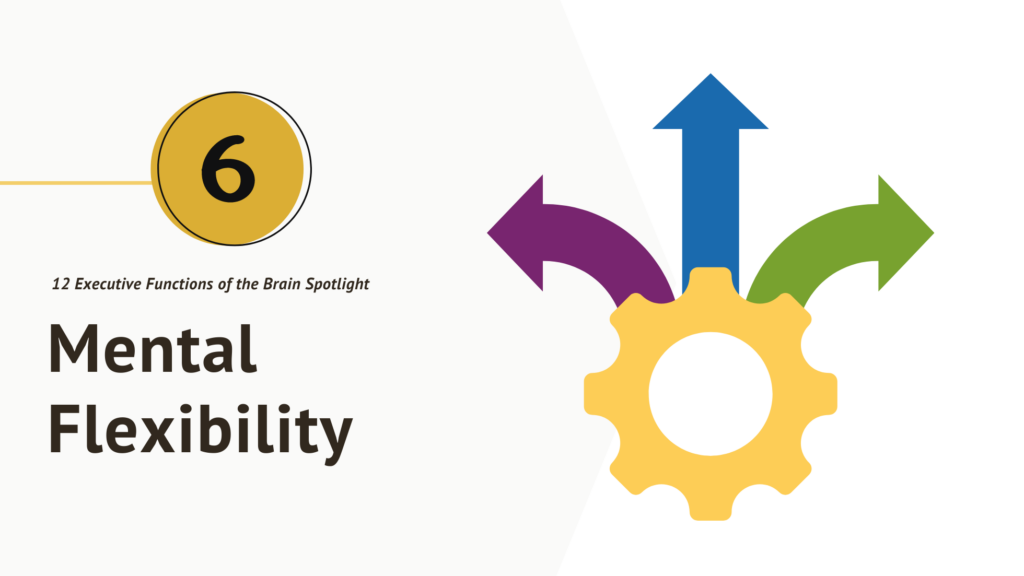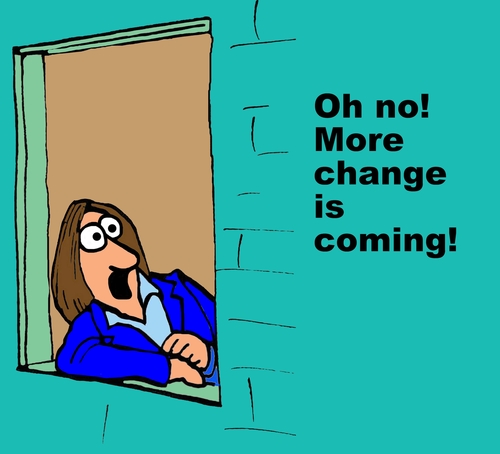2 comments
Aloha my friend- great article on mental flexibility! Keep up your wonderful work.
Aloha my friend- great article on mental flexibility! Keep up your wonderful work.

The sixth in our series highlighting specific executive functioning skills will focus on one not typically highlighted: flexibility.
I’m not talking about yoga flexibility; I am referring to mental flexibility. This is the skill that helps us adapt to changing circumstances in our environment. We use mental flexibility to:
A flexible brain can switch gears as needed throughout the day. It smooths the transitions from one expectation to another, from one point of view to another.
When discussing the executive function skill of mental flexibility, it’s helpful to flip the script and describe behaviors that represent an INflexible brain. An inflexible brain:

When an inflexible brain has a mental picture of what to expect, and someone alters that picture, they will often show reactive behavior, even to something as “simple” as a change in the menu for dinner.
Take a pause and think about your own brain for a moment. Did any of those descriptions of mental inflexibility ring true?
In my experience with my Seeing My Time® clients, those with mental inflexibility don’t readily self-identify this weakness in their executive functioning. They think they are fine. It’s the rest of us who create the problems.
Once I understand that a person has mental inflexibility hardwired into their brain, I can step back and use my own brain’s flexibility to have compassion for those who struggle with this particular executive function skill.
Life isn’t easy for them. Life so rarely goes according to plan.
Interestingly, having too much mental flexibility can also cause problems. In this case, I am thinking of those folks – often creative types – who have so MANY options or possible plans bouncing around in their brains that they can freeze, unsure of which choice to make.
As a result, they may jump from one uncompleted task to another and feel frustration and despair. They have difficulty choosing what to prioritize – another executive function of the brain.
Mental flexibility isn’t one of those executive function skills that can easily be supported with typical time tools like clocks, to-do lists, or planners. Your best bet is to focus on building metacognition: self-awareness. When you become aware, you can start to make different choices.
When you observe a challenging behavior response in someone else due to inflexibility, or if you see an overblown reaction in yourself, pause. Take a deep breath, and give yourself time to come back later with a calm brain. Signal to the person you are with that you are taking a deep breath to calm yourself. This also models for them what it looks like to step back and regroup.
Once everyone is calm, a discussion can take place about where the frustration lies, and how to get past it. If words feel too stressful, the conversation can include drawings or simple cartoons showing possible solutions or alternative paths forward.
If you have too much mental flexibility, you may also do well with drawing or writing your options, getting those ideas out of your brain and onto a piece of paper. If you can’t choose which is most important, reach out for help. Another person’s point of view can help you choose which is the most important plan for today. The rest can be “saved” for another day.

Drawing different responses or outcomes can help the brain choose what to do next.
I wish I had a magic wand to ease the pain of struggling with mental flexibility. The best I can offer is to manage your own brain’s response. Have compassion. Understand their needs and help them to understand their brain. Help them to set up routines with defined optional pathways should plans have to change. Their brain craves predictability and routine. Patience.
Little by little…
Marydee
Marydee Sklar is the president of Executive Functioning Success and the creator of the Seeing My Time Program® and the Set Up Success and Seeing My Time® planners. She is an educator and author of three books on executive functions, as well as a trainer and speaker. Marydee has more than twenty-five years of experience working with students and adults with executive function challenges.
12 Executive Functions of the Brain Spotlight: #7: Sustained Attention
12 Executive Functions of the Brain Spotlight: #5 Task Initiation
12 Executive Functions of the Brain Spotlight: #4 Prioritization
12 Executive Functions of the Brain Spotlight: #3 Planning
Aloha my friend- great article on mental flexibility! Keep up your wonderful work.
Aloha my friend- great article on mental flexibility! Keep up your wonderful work.